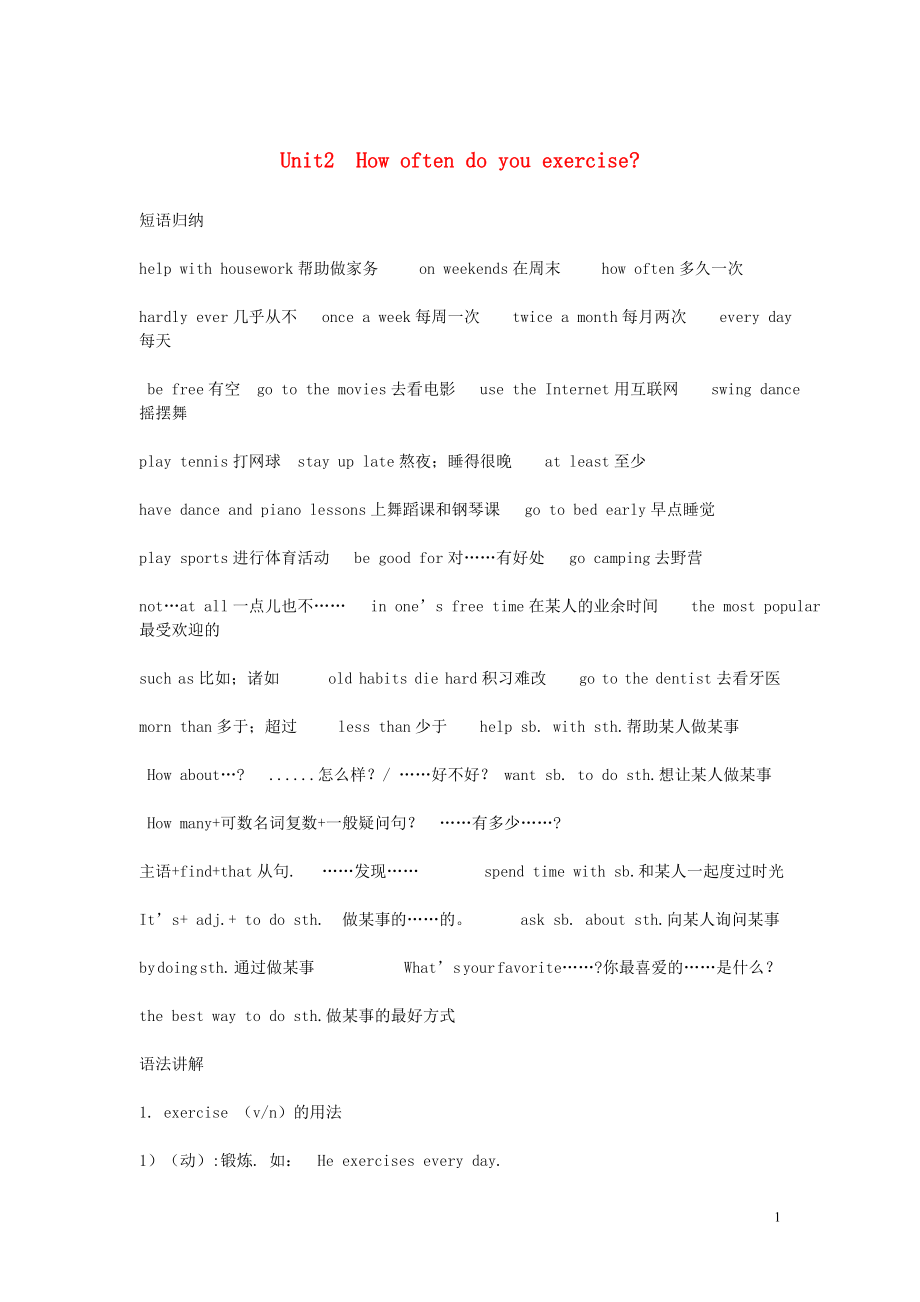《2019年八年級(jí)英語上冊 Unit 2 How often do you exercise知識(shí)點(diǎn)總結(jié) (新版)人教新目標(biāo)版》由會(huì)員分享����,可在線閱讀,更多相關(guān)《2019年八年級(jí)英語上冊 Unit 2 How often do you exercise知識(shí)點(diǎn)總結(jié) (新版)人教新目標(biāo)版(5頁珍藏版)》請?jiān)谘b配圖網(wǎng)上搜索�����。
1����、Unit2 How often do you exercise?
短語歸納
help with housework幫助做家務(wù) on weekends在周末 how often多久一次
hardly ever幾乎從不 once a week每周一次 twice a month每月兩次 every day每天
be free有空 go to the movies去看電影 use the Internet用互聯(lián)網(wǎng) swing dance搖擺舞
play tennis打網(wǎng)球 stay up late熬夜��;睡得很晚 at
2���、least至少
have dance and piano lessons上舞蹈課和鋼琴課 go to bed early早點(diǎn)睡覺
play sports進(jìn)行體育活動(dòng) be good for對……有好處 go camping去野營
not…at all一點(diǎn)兒也不…… in one’s free time在某人的業(yè)余時(shí)間 the most popular最受歡迎的
such as比如�;諸如 old habits die hard積習(xí)難改 go to the dentist去看牙醫(yī)
morn than多于����;超過 less tha
3、n少于 help sb. with sth.幫助某人做某事
How about…? ......怎么樣�?/ ……好不好? want sb. to do sth.想讓某人做某事
How many+可數(shù)名詞復(fù)數(shù)+一般疑問句�? ……有多少……?
主語+find+that從句. ……發(fā)現(xiàn)…… spend time with sb.和某人一起度過時(shí)光
It’s+ adj.+ to do sth. 做某事的……的。 ask sb. about sth.向某人詢問某事
by doing sth. 通過做某事 Wha
4、t’s your favorite……?你最喜愛的……是什么�?
the best way to do sth.做某事的最好方式
語法講解
1. exercise (v/n)的用法
1)(動(dòng)):鍛煉. 如: He exercises every day.
2) (可數(shù)名詞):“...操;練習(xí)”. 如:do morning/ eye exercises; do math exercises
(不可數(shù)名詞):“鍛煉;運(yùn)動(dòng)”講:如: We often do / take exercise on weekends.
2. ----How often do you usually g
5、o shopping? —Sometimes/Twice a week. 有時(shí)候/一周兩次.
1) go shopping 意為“去購物”�����。Go+ v- ing : 表示進(jìn)行某項(xiàng)活動(dòng)�����。如:
Go swimming/ shopping/skating/skiing/fishing/climbing/hiking
2)頻率副詞:always=all the time, usually, often, sometimes=at times , hardly ever, never
(1).sometimes: 有時(shí)候�;sometime:某時(shí);some times:許多次/倍; some
6�、time: 一段時(shí)間
(2). hardly(adv): 幾乎不 硬的;困難的���;嚴(yán)厲的����;勤奮的 a hard writer
努力地���; 猛烈地 study/rain hard
3)how often表示“多久一次”�����,是對動(dòng)作的頻率進(jìn)行提問����。其回答通常有:
頻率副詞: always, usually, often, sometimes, hardly ever, never
how often 次數(shù)+時(shí)間段: 如:once or twice a week
every +時(shí)間段: every day (每天) 區(qū)別:everyday(每天的;
7�、日常的)
注意:表示“一次或兩次”時(shí),一般用once和twice表示�����。如:once a month(一個(gè)月一次)
而表示“三次或以上”時(shí)�����,則用“數(shù)詞+times”結(jié)構(gòu)�。如:five times a year (一年五次)
4)?由how構(gòu)成的疑問詞組的用法
how?many+ 可數(shù)名詞復(fù)數(shù) 如:how many programs
how?much+不可數(shù)名詞 如:how much coffee
但how much=what’s the price of..? 還有“多少錢”的意思 如:How?much?are?those?pants?
how many times:
8���、“多少次”. 其答語表示次數(shù)��。如:once ,twice�����,three times等
How old...? 詢問年齡 如:How old are you? I am five.
(4) 多久(時(shí)間) 常用 for two days�,for three hours等回答。
多長(某物的長度) 如:---How long is the river? --- 10 kms.
(5)how soon 用來詢問過多久����,多久以后,其答語是in two hours�����,in three days等���。
如:How soon wil he co
9����、me back��? In an hour��。
3. “空閑的”:Are you free tonight? 4. at least 至少 at most 最多
be free “自由的”: a free country freedom(n) 5. stay up 熬夜
“免費(fèi)的”: work for free. 6. junk food 垃圾食品
5. “滿的��;飽的” …be full of… : The bottle is full of water. 瓶子里裝滿了水��。
“忙的”=busy
10���、 He had a full life
6.She says it’s good for my health. 她說那對我的健康有益�����。
(1)be good for:“對……有好處”��。 如:Doing exercise is good for our health.
(2)be good at:“擅長于……” 如:He is good at playing football.
(3) be good to sb./sth: “對……好” 如:The old woman is good to us.
(4) be good to do sth.: “適合��;宜于” 如:
11��、The water is good to drink.
(5) be good with: “與……相處好” 如: The teacher is good with his students.
7.go online = use the Internet :上網(wǎng) 8. Teenager magazine 青少年雜志
9. more than two hours=over two hours:超過 10. go to the dentist: 去看牙醫(yī)
11. keep healthy = stay healthy = keep in good he
12��、alth: 保持健康
12. ask sb. to do : 叫…做某事 Teacher asked me to clean the classroom.
Ask sb. not to do sth.: 叫…不要做某事 Teacher asked me not to clean the classroom.
ask sb. about sth. : 問某人某事 We asked our students about their free time activities.
ask sb. for sth. : 向某人要求… 如:ask te
13����、acher for help
13. help sb. with sth. 如:They help me with this problem. 他們幫助你解決這個(gè)問題。
help sb.(to)do. 如:They help you (to) solve this problem. 他們幫助你解決這個(gè)問題���。
14. (n) 驚訝: to one’s surprise 令某人驚訝的是 in surprise 驚訝地
surprise be surprised at sth. 對… 感到意
14��、外
v) 使驚奇、意外: be surprised to do sth. 驚訝做某事
be surprised that + 從句
如:I was surprised at the news = I was surprised to hear the news.
15. fifteen percent of the students 百分之十五的學(xué)生 16. swing dance 搖擺舞
17. although(conj):“盡管�����;雖然”���,表示轉(zhuǎn)折關(guān)系��,同義詞有though, 不能與but同時(shí)使用��。
如: Although they’re neighbor
15��、s, they don’t play together.
= They’re neighbors, but they don’t play together. 盡管他們是鄰居�,但是他們不在一起玩。
18. maybe (adv): 也許����,大概 (Maybe) he (maybe) knows it.
May + v(原):也許,大概 He may know it.
如:Maybe he is at home.= He maybe is at home.= He may be at home.
19. It’s good to relax by using the I
16���、nternet or watching game shows.
by: He learns English by singing English songs.
通過… 方式 He went home by bus.= He went home on the bus= He took the bus home.
through 通過… 方式+ 名詞: The best way to relax is through exercise
(從…里面)穿過: Climb through the window.
注意
17���、: 橫過(從一邊到另一邊) walk across the street.
20. such as =like + 名短: 如: such as winning the game.
for example + 句子: 如:It’s healthy for the mind and the body.
21.Old habits die hard. 惡習(xí)難改. die(v):死亡;消失 death(n): 死亡���;
dead(adj): 死的�����; dying(adj): 垂死的����;臨終的;(植)枯萎的 dying wish----遺言
21.Yo
18����、u can spend time with your friends and family as you play together.
度過(時(shí)間) 如:spend the weekend with family
花費(fèi)(時(shí)間、錢) 如:He spent 20 yuan (in) buying the magazine.
同義句:He spent 20 yuan on the magazine.
He paid 20 yuan for the magazine.
It took him 20 yuan to buy the magazine.
The magazine cost him 20 yuan.
5
 2019年八年級(jí)英語上冊 Unit 2 How often do you exercise知識(shí)點(diǎn)總結(jié) (新版)人教新目標(biāo)版
2019年八年級(jí)英語上冊 Unit 2 How often do you exercise知識(shí)點(diǎn)總結(jié) (新版)人教新目標(biāo)版

